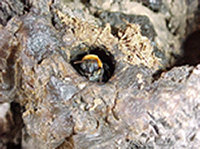|
|
| The culture of the jandaira bee (Melipona subnitida) as an activity for sustainable development
Its rational culture is performed principally in northeastern Brazil, where Jandaira, uruçú and tiúba bees are manipulated using techniques that are now popular and consecrated. The Jandaira (Melipona subnitida Ducke) is a typical meliponine bee from the sertão (semi-arid zone located in the interior of the northeast of Brazil). Its honey is very appreciated by the local population. However, there is not much literature on its biology. A pioneer work was done by Monsignor Huberto Bruening published as a book, "A Abelha Jandaira" in 1990, (collection Mossoroense, series C, vol. DLVII), from which we will present many fractions in this site. Here we describe handling techniques developed by the people of the region. The culture of the Jandaira bee can also be managed by the "minors", term designated to children and women in Brazil. The culture of Jandaira is considered an activity for sustainable development because it includes environmental restoration and by reforestation y by the preservation of trees used for nesting. The role of bees as pollinators of the local native flora is also recognized. The principal products for commercialization are the honey and swarm production. This study is part of the project "Culture of Caatinga native bees as a developmental sustainable activity" done by ADEMASP - Environmental Defense Association of São Paulo, Ecology Department of the University of São Paulo, and the Federal University of Paraíba. It is financed by the PPP, (Program for small projects) of the GEF - Global Environmental Facilities. This study was mainly performed in Jardín do Seridó, in the State of Rio Grande do Norte, northeastern Brazil. INVESTIGATORS
INSTITUTIONAL SPONSORSHIP
FINANCIAL SPONSORSHIP Photography English translation: Olga Inés Cepeda Aponte |
 Brazil
is a country rich in social native bees, known as indigenous stingless
bees, or meliponine bees.
Brazil
is a country rich in social native bees, known as indigenous stingless
bees, or meliponine bees.